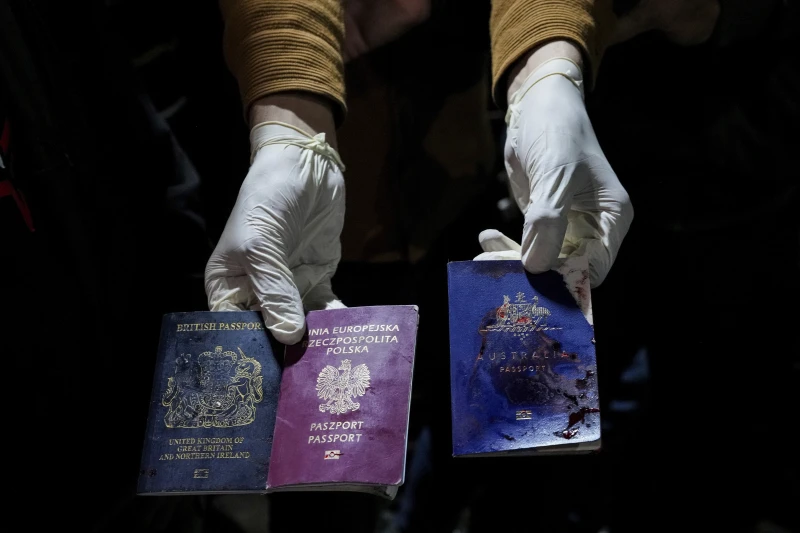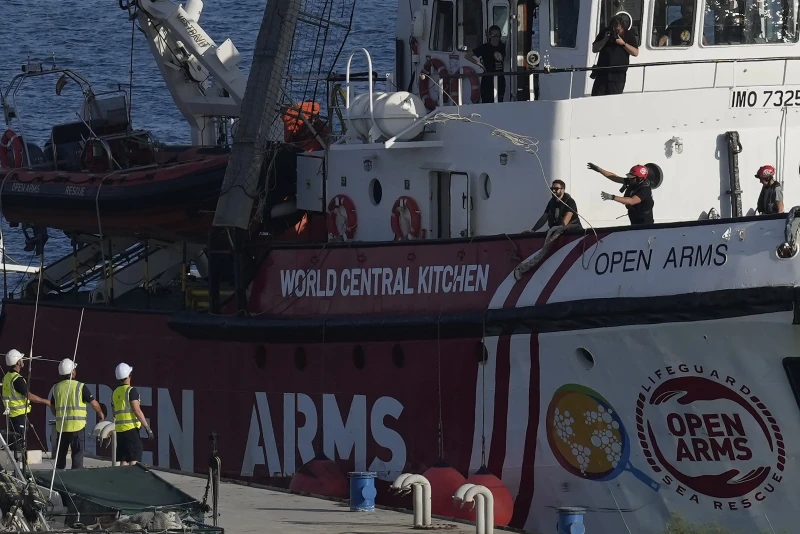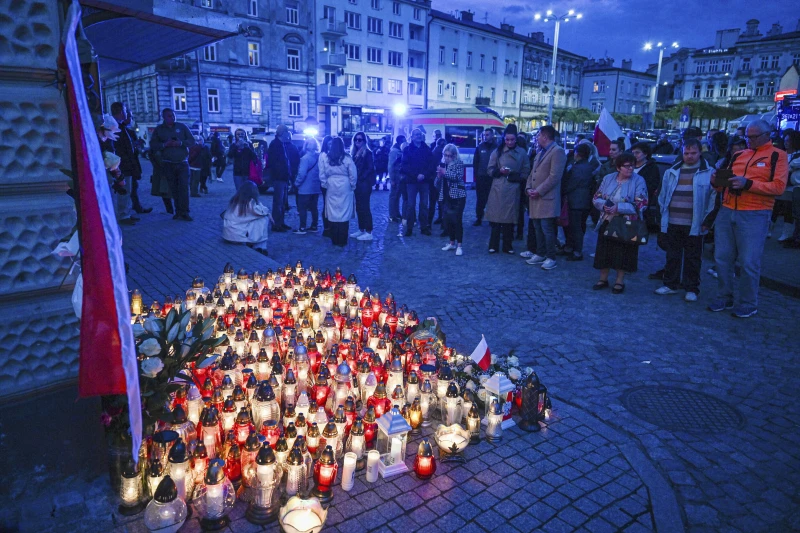DEIR AL BALAH, Gaza Strip (AP) — The humanitarian crisis in Gaza, exacerbated by months of war and conflict, has brought to light the immense challenges faced by aid organizations in delivering essential supplies to those in need.
The tragic events that unfolded on a fateful night underscore the dangers and difficulties inherent in providing assistance in such volatile environments.
As the sun set and darkness descended upon the war-torn region, a convoy of aid trucks set out on a perilous journey to deliver much-needed food supplies to the beleaguered population.
Escorted by dedicated aid workers from the World Central Kitchen, the convoy braved the treacherous roads of Gaza, marked by destruction and despair.
The convoy’s arrival at a warehouse marked a brief moment of respite, a glimmer of hope in a landscape marred by devastation.
However, tragedy struck swiftly and mercilessly, shattering the illusion of safety and security. In a cruel twist of fate, all seven aid workers lost their lives in a sudden and brutal attack, leaving behind a void that can never be filled.
The efforts of organizations like the World Central Kitchen to combat hunger and prevent famine in Gaza are nothing short of heroic. In the face of overwhelming obstacles and limited resources, these dedicated individuals work tirelessly to ensure that food reaches those who need it most.
The decision to deliver aid by sea, a bold and innovative approach, speaks to the unwavering commitment of these humanitarian organizations to fulfill their mission despite the risks involved.
The harrowing reality of life in Gaza, where millions are cut off from regular food deliveries and basic necessities, underscores the urgent need for sustained international support and solidarity.
The toll of the conflict on the civilian population, with thousands dead and many more displaced, paints a grim picture of the human cost of war.
In the midst of tragedy and loss, the spirit of resilience and compassion shines through. The World Central Kitchen, under the leadership of celebrity chef José Andrés, exemplifies the power of humanitarian aid to make a difference in the lives of those affected by conflict and disaster.
Their commitment to providing culturally appropriate meals and meeting the unique needs of local communities sets a standard for excellence in humanitarian relief efforts.
As we reflect on the events that unfolded on that fateful night, we are reminded of the fragility of life and the courage of those who risk everything to help others.
The memory of the aid workers who lost their lives in the line of duty serves as a poignant reminder of the sacrifices made in the pursuit of a more just and compassionate world.
In conclusion, the tragedy that befell the aid workers in Gaza serves as a stark reminder of the challenges and dangers faced by humanitarian organizations operating in conflict zones.
Their dedication and selflessness in the face of adversity inspire us to stand in solidarity with those in need and to work towards a future where peace and prosperity prevail.
May their legacy be honored through continued efforts to alleviate suffering and build a more equitable world for all.

The humanitarian mission undertaken by World Central Kitchen in Gaza in early April was marred by a tragic incident that resulted in the loss of innocent lives and raised questions about the effectiveness of deconfliction systems in conflict zones.
The convoy, consisting of eight trucks carrying vital supplies for the people of Gaza, was targeted by Israeli forces under the belief that armed individuals were present among the aid workers.
The series of events that unfolded that night revealed a tragic misunderstanding and a failure in communication between the aid organization and the Israeli military.
Despite efforts by World Central Kitchen to ensure the safety and security of their team, the presence of armed guards or individuals near the convoy led to a deadly airstrike that claimed the lives of several aid workers.
The incident highlights the complex and challenging nature of humanitarian work in conflict zones, where the lines between civilian aid workers and armed groups can often blur.
The risks faced by those providing essential assistance to vulnerable populations are exacerbated by the presence of armed actors and the difficulties in distinguishing between them.
The aftermath of the airstrike saw conflicting accounts from both sides, with Israeli officials claiming that they had not received information about the aid workers’ movements and intentions.
The lack of visibility of World Central Kitchen emblems on the vehicles further complicated the situation, leading to a tragic outcome that could have been avoided with better communication and coordination.
As the world grapples with the consequences of this unfortunate incident, it serves as a stark reminder of the challenges faced by humanitarian organizations operating in conflict zones.
The need for improved deconfliction mechanisms, clear communication channels, and a shared commitment to the protection of aid workers is paramount to prevent such tragedies from occurring in the future.
In the face of adversity and danger, the dedication and courage of humanitarian workers like those from World Central Kitchen shine through.
Their selfless efforts to provide essential aid and support to those in need, even in the most perilous circumstances, embody the best of humanity’s spirit and resilience.
As we reflect on the events of that fateful night in Gaza, let us honor the memory of the aid workers who lost their lives and reaffirm our commitment to supporting and protecting those who risk everything to bring hope and assistance to the most vulnerable among us.
May their sacrifice serve as a catalyst for positive change and a renewed focus on ensuring the safety and security of humanitarian workers worldwide.
Israel’s promises have done little to quiet growing international anger over its offensive. More than 200 aid workers have been killed in Gaza since the war began, including at least 30 killed in the line of duty, according to the U.N.
Many aid workers noted the convoy strike stood out only because six of those killed were not Palestinian. Aid workers are, in many ways, a hard community to define.
Some are experts who earn a good living traveling from disaster to disaster. Some are volunteers looking for a way to do some good. Some are driven by ambition, others by faith. In Gaza, though, everyone understood the risks.

John Flickinger’s son Jacob, a Canadian military veteran, was a member of the convoy’s security team. “He volunteered to go into Gaza, and he was pretty clear-eyed,” Flickinger told the AP. “We discussed it, that it was a chaotic situation.”
While World Central Kitchen and a few other aid groups suspended operations in Gaza after the attacks, many of the largest organizations, including Doctors Without Borders and Oxfam International, barely slowed down.
The convoy strike “wasn’t outside of things that we could have predicted, unfortunately,” said Ruth James, a UK-based Oxfam regional humanitarian coordinator. Except for one cancelled trip, Oxfam staff simply kept working. “What keeps them going?” she asked. “I can only guess.”

